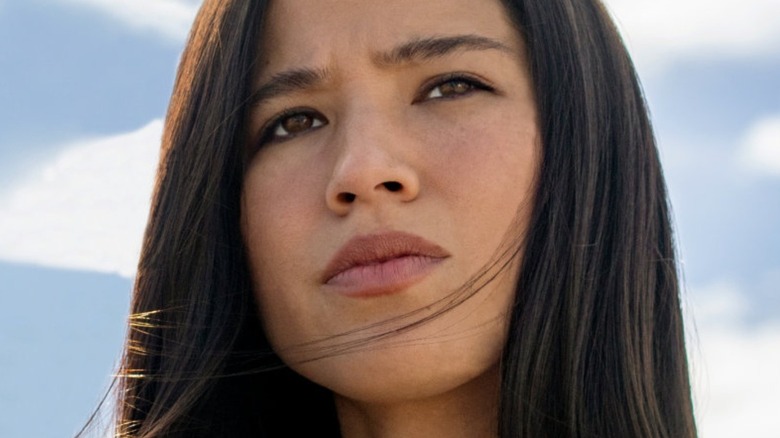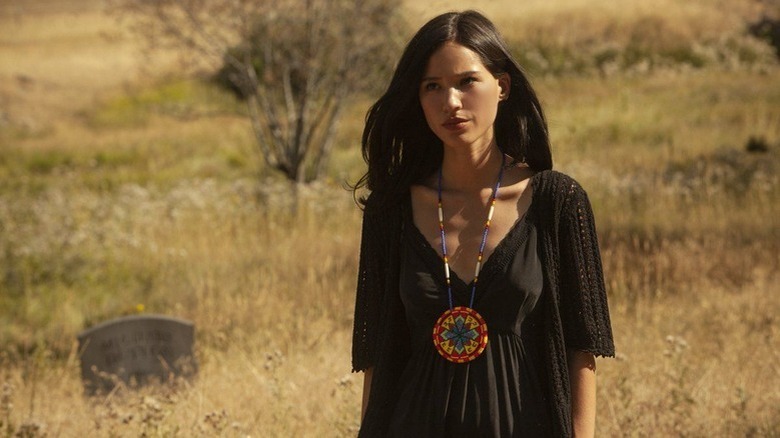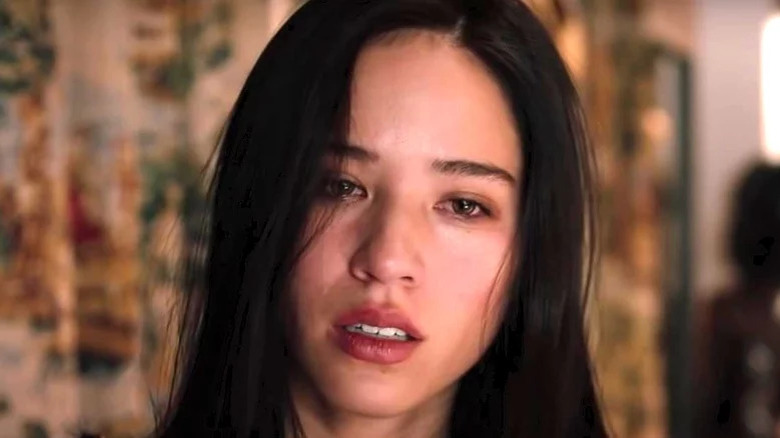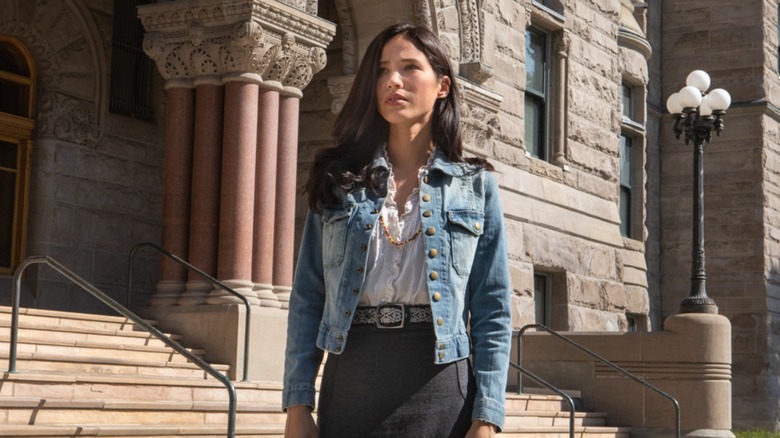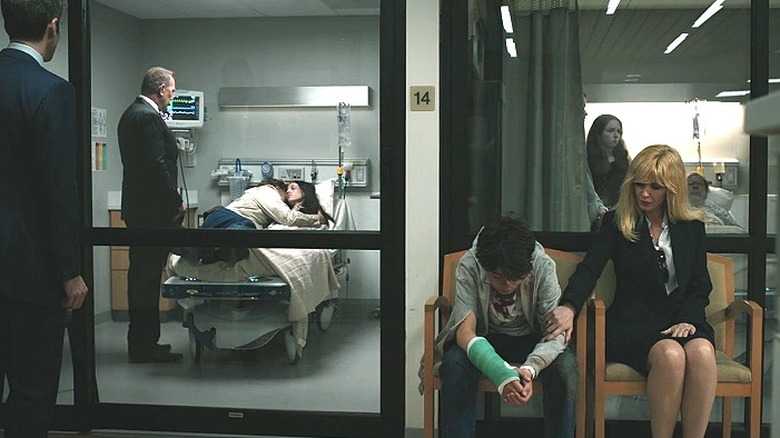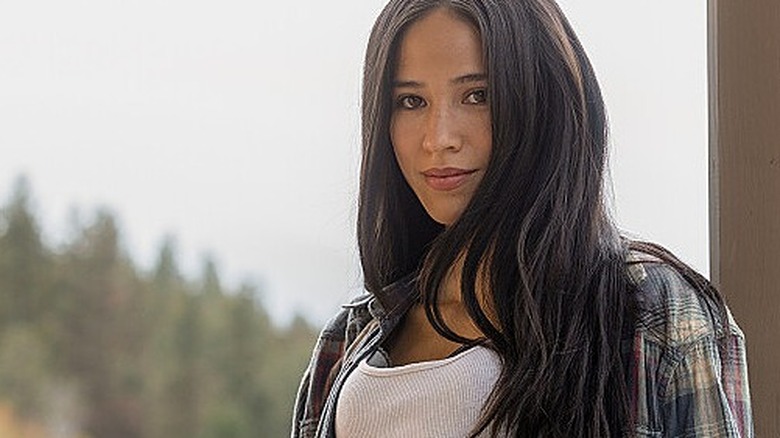Yellowstone Fans Are Losing Their Patience With Monica, And The Writing Deserves All The Blame
Contains spoilers for "Yellowstone" Season 5 Episode 4, "Horses in Heaven"
To be a member of the Dutton family in "Yellowstone" is to spend your life defending your physical and mental real estate, both from outside threats and from the machinations of your own family members. However, there are exceptions to the ruthless streak that runs in the members of the rancher family. Having married into the family, Monica Dutton (Kelsey Asbille) tends to be more level-headed than pretty much any other character bearing the name. Though she goes through her own crises — both in her relationship with Kayce (Luke Grimes) and otherwise — she's generally the most sensible person in any given room that contains multiple Duttons.
Unfortunately for Monica, comparatively normal people aren't necessarily the most popular ones in their shows, especially when said shows tend to focus around ruthless people who operate in an extremely grey moral area. While viewers have been moved by scenes like Monica's most heartbreaking moment in "Yellowstone" Season 4, it appears that their goodwill toward this gentler character isn't eternal. Have the events surrounding the death of Monica and Kayce's child and the former's growing discontent with the Dutton ranch caused some viewers to turn on the character, or is there some underlying reason behind their animosity? Let's take a look at the reason "Yellowstone" fans are losing their patience with Monica.
Some fans are tired of feeling sorry for Monica
Monica's reservations toward the Dutton lifestyle might be reasonable, but the show's approach to the character seems to have started rubbing some fans the wrong way. In "Yellowstone" Season 5 Episode 4, "Horses in Heaven," the character experiences one of the worst days of her life, as she undergoes a ceremony to bury her baby — along with the horse that gives the episode its name. Fans have even been getting emotional over Monica's tender moment with John Dutton (Kevin Costner), in which the no-nonsense Dutton patriarch takes some time to comfort Monica with choice words of wisdom.
For some viewers, however, Monica's constant turmoil isn't quite so moving. Instead, Season 5 viewers have noted that Monica has become the show's go-to character for sympathy points, while also being off-puttingly critical of the Dutton lifestyle. "If Monica can't stand the Dutton family and hated staying at the house, why is she burying her son on their property?" Twitter user @NickkiH asked as the events of Episode 4 played out.
Twitter fans are vocal about their dislike of the character
Instead of taking affront with any specific action Monica has done in the show, it appears that in some corners of the fandom she's built a reputation as a generally annoying character — at least, going by the online reaction she's been getting during her Season 5 appearances.
"I've never liked Monica. All she does is whine. He's a Dutton. If you don't like it why did you marry him?" @Tiffany54656986 wrote. "Monica Dutton gets on my very last nerve. The most annoying person on #Yellowstone," @meowmeowbeans19 tweeted. Elsewhere, user @OhSnapDang posted a differently worded version of essentially the same tweet, writing, "Monica Dutton is the most aggravating and annoying character on #Yellowstone." Others, like @citrinecowgirl, @dtbradford92, @Samantha_T_09 and @ReynoldsLawgirl, aired similar views about the character, wording their issues with Monica in varying but unmistakable ways.
While Monica has given fans many heartwarming and emotional moments over the years, it appears that at least some viewers have grown tired with either the way the show tries to tug their heartstrings with the character, or Monica's unwillingness to fully accept and embrace the rogue Dutton lifestyle. Perhaps future episodes of "Yellowstone" will correct and adjust the character's course and endear her to fans ... or perhaps they'll just double down on their criticism. Meanwhile, Monica's smaller Season 5 role has some fans worried for her life, so whether you love the character or dislike her, it's an interesting time to be a "Yellowstone" fan.
Monica's role in the show has pivoted (for the worse)
In an interview with KCRW, Professor Tressie McMillan Cottom points out how "Yellowstone" attempts to chip away at the mythology of the American West. "You have a well-fleshed out Native American cast in the show, and you have some cosmetic racial diversity," she says. This is an accurate assessment of the series' better intentions, particularly in Seasons 1 and 2, when both the tribal narrative and Monica and Kayce's relationship played a less superficial role. But McMillan Cottom's word choice is revealing. The racial diversity is "cosmetic," and the Native American cast is "well," not "fully," fleshed out. And the show's gradual then sudden move away from a central narrative that highlighted both the Duttons' tension with other Montanans (as opposed to Evil Californians) has been accompanied — when it didn't need to be — by a disregarding of Monica's relevance and meaning in the story.
At the outset, Monica had a job. Monica had a degree. Monica was supposedly integral in highlighting — as Sheridan happily boasts in an interview with the Atlantic — "the way Native American women were treated." Most importantly, Monica was meant to be Kayce's equal, a partner who kept him from turning to the Dutton dark side, rather than an obstacle to his happiness. In recent seasons, Monica gets assaulted (again). Monica gets injured (again). Monica goes to the hospital (again). Monica cries (again). Monica suffers (again, and again, and again).
In Season 5, Monica exists to highlight the torn Kayce's role as The Good Dutton. His Heroic Cowboy decision to choose her is the sole reason for her existence, a writing decision with indefensible implications and disastrous consequences.
Monica is a poorly written Rorschach test
"Why do they keep putting Monica Dutton as a character where we have to feel sorry for her?" a fan on Twitter asks, adding "The victim role has been played out." It certainly has, but maybe not for the reasons so many of her steadfast haters on social media appear to think. Tweets like, "[Monica] whines about everything and [is] extremely ungrateful for all that John has done for her and the sacrifices Kayce has made [...] she has a lot of animosity against the white man yet she slept with one" (via Reddit) speak for themselves, to say nothing of the litany of comments too abusive and toxic (and even more racist and misogynistic) to disclose here.
Given the show's baffling and — from a strictly narrative standpoint, lazy — move away from treating Monica as a whole human, it's genuinely hard not to wonder if a certain contingent of the series' fans didn't have an influence on the writing. Because the Monica we're following at this point is far away from the Monica we met at the beginning of the series, and not in a good way.
In '"Yellowstone' Doesn't Have a Monica Problem, It Has a Taylor Sheridan Problem," Dustin Rowles writes, (in response to said fans pleading with the series to "Kill Monica,") "The problem is that all the other major characters in the series have gone through [trauma], but they are heroic, resilient survivors. Not Monica. Monica is an anchor tied around not only the neck of her husband but the entire murderous Dutton family. No wonder viewers want her to die...but don't blame Monica. Blame Taylor Sheridan. He's the one that turned Monica into Debbie Trauma."
Monica is a broken device, not a broken human
And so he did. As IndieWire's Kristen Lopez observes, "Even when Monica is presumed to have agency, it is only used to showcase pain and trauma for entertainment purposes."
As a soap opera in contemporary western clothing, one expects a certain degree of tragedy and melodrama, but it is only Monica who's yet to reap the (narrative) benefit of her experiences in the form of a display of strength or revenge (see: Beth Dutton) lessons learned (see: Kayce Dutton) or prompted action and response (see: literally every character who is not Monica Dutton). Were Monica written to exemplify a different kind of strength, or to stand in contrast to Beth's volatile and cartoonish Strong Female Character, that might redeem some of her suffering. But as it stands, Monica's pain serves, as Lopez notes, to make viewers recoil at the tragedy of it all.
It's a curious use of the character, considering just how many viewers have grown tired of that exploitation, and so much so that they're willing to blame the character, or even the actor, for low-hanging fruit writing. Monica is, indeed — as so many of her haters point out — a perpetual victim. But Monica is also — and here's the really, really important (but apparently not all that obvious) point — a fictional character. She exists because she was written. Unfortunately, she also really doesn't exist, at least not in the way every other character gets to, because of how she is written.
